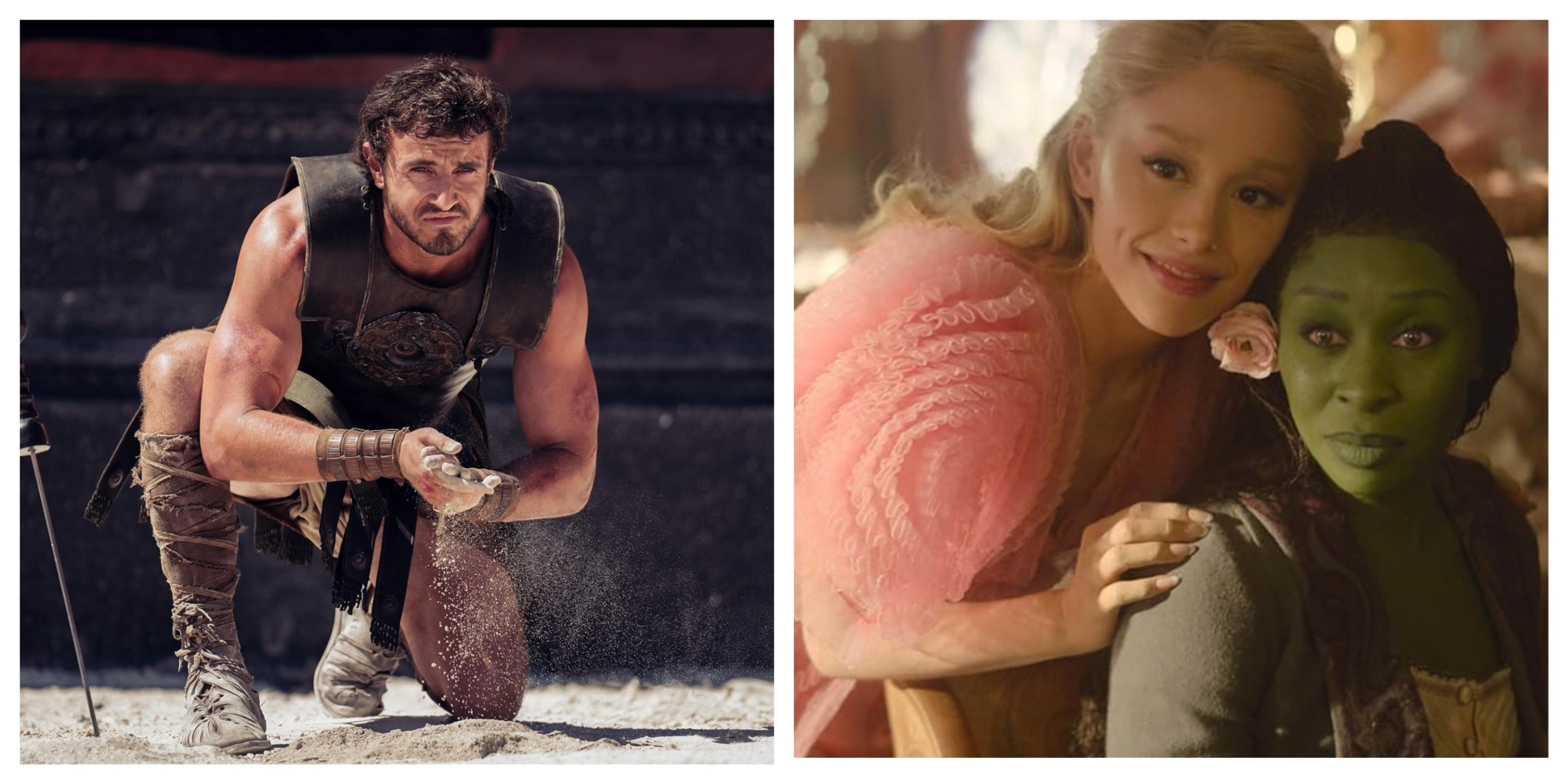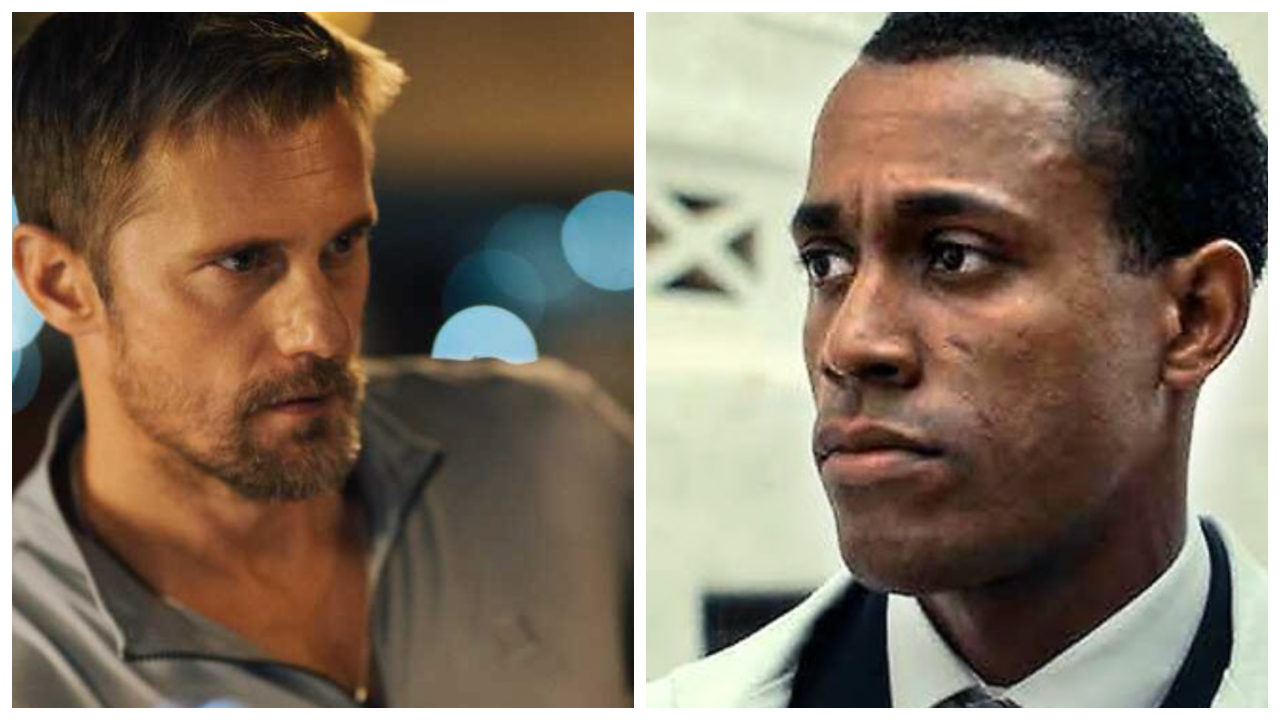Nothing against Wicked, but I have seen better movie musicals set in Oz.
However well the 21-year-old Tony-laded Oztravaganza about the origins of the Wicked Witch of the West may work as a stage musical (I admit, I haven’t seen it, though I can imagine it’s quite a spectacle), as a film it begs comparisons to… well, you know, that other movie about a wizard.
That may not be true for generations of Wicked-heads out there, to whom this expansive two-parter arrives like Barbie raised to the Barbie-th power. (Part one stretches over 160 minutes, so the concluding installment, due a year from now, will likely bring us to over five hours of Wicked in total.) Wicked is an Event Movie, just as Wicked was an Event Play.
Many diehards were in costume or at least decked out in green and pink at the Marcus West End in St. Louis Park last weekend for the preview. Their applause for certain numbers registered as approval as much as delight; when OG stars Idina Menzel and Kristin Chenoweth got an onscreen moment, the fans acknowledged that they had been serviced. Singalong screenings are already in the works (with an irritating advance force refusing to wait) and any parents of theater kids who escape being subjected to “Defying Gravity” on repeat in the months ahead will only have their children’s EarPods to thank.
As an event then, Wicked is good fun. As a musical? Well, it’s symptomatic of how musical theater, once a thriving hybrid of styles near the center of popular culture, has long ago attenuated into a subgenre with precise limitations and fan expectations. I’ll still take Wicked songwriter Stephen Schwartz’s generically inspirational pop over the wan schlock of the dreaded Pasek and Paul, though not the crafty patter of Lin-Manuel Miranda. (Full disclosure: Schwartz first annoyed me before I ever knew his name, via Godspell’s “Day by Day,” but I’m partial to 1978’s Working, which is, I shit you not, a musical adaptation of the Studs Turkel book.)
But I’ll also take actually existing popular music (not to mention a catchy little number called “Over the Rainbow”) over Schwartz’s approximations, which are often all swoop and no hook—you don’t remember the melodies, you remember the emotional gulp they mean to give you. “Defying Gravity” was one of the few Wicked ballads I could still hum by the time I made it back to the parking ramp, and not just because it’s the show closer.
As for the story? Well, there sure is a lot of it, courtesy of Winnie Holzman, once a pioneer of thinky teen dramatics with My So-Called Life, who adapted her play for the screen in tandem with script doctor Dana Fox. We begin just after the mortal dousing of the witch herself, Elphaba (Cynthia Erivo), as Glinda the Good (Ariana Grande) arrives via her dainty little bubble to confirm the news to the Munchkins. So far, so familiar.
Yet this Munchkinland is a small-minded, petty place, and so is all of Oz. While we already know the Wizard is a fraud, he’s hardly the genial midwestern humbug of Frank Morgan’s portrayal, but a scatterbrained charmer with a real authoritarian bent. In other words, he’s Jeff Goldblum.
And who exactly was this Wicked Witch? If you’ve got a few hours to spare, Wicked will tell you.
Born green and shunned by her parents, Elphaba blames herself for her sweet sister Nessarose’s disability, and when she gets angry, objects are flung with an uncontrolled Carrie-like violence. At Shiz University, she’s handpicked for a sorcery seminar by the imposing Madame Morrible (Michelle Yeoh), to the dismay of aspiring witch Glinda, who she’s forced to room with. (Awkward!) Elphaba nurses dreams of meeting the Wizard, believing he can degreenify her complexion; she also learns that there are plans afoot to cage and silence the talking animals of Oz, including her beloved history professor, Dr. Dillamond, a goat. And then there’s a Prince Fiyero that both Glinda and Elphaba crush on and there’s this other guy Boq who asks Nessarose out but is in love with Glinda, and…
So yeah, there’s a lot going on here, considering this is still just part one, and from the synopsis I just read it’s not getting any less streamlined in part two, when, yes, a certain house comes to Munchkinland. Keep in mind that The Wizard of Oz gets a girl from black-and-white Kansas to Technicolor Oz and back again in a brisk 102 minutes.
Visually, Wicked isn’t a hideodeus movie, to adopt the Popeye-like slang of Oz, though it is often a cluttered one. The ingenious steampunk contraption behind which the Wizard hides is truly impressive, and there’s a remarkable moment during “The Wizard and I” when a mobile of colored glass temporarily transforms Elphaba’s skin. The costumes rock.
And yet the climax, where Elphaba, plummeting from a high up tower in the Emerald City, recovers her broom at the last minute and begins soaring, is a VFX fumble. Mostly, Wicked’s look is just blandly unmagical—if you want proof that technological progress is a lie, compare the washed out CGI here to the still glorious bursts that Technicolor once gave us.
At a time when few directors have any interest in capturing the excitement of human movement onscreen, John M. Chu consistently puts his Step Up pedigree to good use. He makes space for Christopher Scott’s fine choreography. But that a journeyman like Chu has become Hollywood’s go-to musical guy shows just how little we now expect from the genre.
What keeps Wicked from spinning off its axis is the relationship between the two women at its core. The film doesn’t really perk up until “What Is This Feeling?,” an Elphie/Glinda duet about their shared loathing that’s also the most erotically charged number here. (“I’m Not That Girl,” regarding the girls’ token love interest, is a cold shower comparatively.) That attraction/repulsion ramps up when Elphaba debuts her trademark pointed hat at a dance, at Glinda’s nefarious urging. Strangely moved by how Elphaba responds to her fellow students’ mockery, Glinda joins her in an elaborate dance as the two pass from outright rivalry to rivalrous friendship.
If anything, Cynthia Erivo has too much screen presence for her already underwritten part, and her almost-adult dignity undermines her character arc. Her Elphaba is no ingénue misled by foolish dreams, and seems incapable of humiliation. Meanwhile, Glinda is a dream of a role that Ariana Grande floats through with perfect timing, flaunting her shallow vanity, scene-stealing blonde hair tosses, and comically sudden upshoots into her showy soprano.
Feel free to differ if “The Wizard and I” was imprinted on your neocortex before you could tie your shoes, but Elphaba’s numbers tend to be ponderous, while Glinda, like the devil, gets all the good tunes. Schwartz does have a way with upbeat character songs, like the makeover jaunt “Popular.” It’s only once the girls make nice and Glinda is reduced to a comic sidekick that Elphaba comes into her own. But by then the movie’s nearly over.
Thinkpieces are surely in the works about how Wicked, the story of a good woman who is cast as an enemy of the people by authoritarians using fiendishly disseminated lies, is a perfect Trump era fable (just as it was a perfect Bush era fable two decades ago). But maybe the best topical lesson that Wicked offers is that villains are often more entertaining than heroes.
Something you might not remember about Gladiator is how much time everyone spends standing around and talking. Between the opening battle in Germania and the closing duel, where Russell Crowe’s wronged gladiator Maximus squares off against Joaquin Phoenix’s duplicitous Emperor Commodus, the time not spent in the arena is laden with a lot of ponderous chatter about the glory of Rome and the dream of Marcus Aurelius and a whole bunch of other historical claptrap that no normal person at the close of the 20th century had much need to ponder.
That was by design. After all, man cannot live by circuses alone. For Gladiator’s action sequences to work, Ridley Scott’s update of the old-timey swords ‘n’ sandals epics of yore had to recapture their wooden pomp as well. Anyway, as Allison Willmore has pointed out, period-costumed men delivering rousing speeches about honor just downright enmushifies ordinarily stoic bros—historical melodrama, like sports, offers blocked-off fellas a safe conduit for their squishier emotions. I say this as the son of a dad who frequently used to fall asleep in his recliner watching Braveheart on HBO.
Gladiator worked as well as it did (which, again, might not be quite as well as you remember) because Scott stocked his film with veteran hams like Richard Harris, Derek Jacobi, and Oliver Reed, as well as young hams-in-training like Russell Crowe and Joaquin Phoenix. These were men who knew how to spout this nonsense as though it were meaningful, nay crucial.
But poor Paul Mescal looks as out of place as the hero of Gladiator II as a puppy at a Senate budget hearing. He’s surely swole enough as the son of Crowe’s Maximus (and a rightful heir to the imperial throne) to credibly wallop challengers in the arena, whether corporeal or poorly animated. But we all know Paulie’s a weeper not a fighter. Every generation needs its moody dreamboat, and Aftersun and Normal People made Mescal that nontoxic totem. He’s a guy more likely to fall on his own sword when his wife is murdered than to seek revenge.
Sixteen years after the events of Gladiator, Lucius has fled Rome and is hiding out, uncertain of his identity, in Numidia. After the Roman general Marcus Acacius (an inert Pedro Pascal) levels Lucius’s adopted city and orders his wife killed, the sullen widower goes willingly to Rome as a gladiator, nurturing visions of vengeance. Here the pitfalls Lucius faces are legion: palace intrigue, CGI baboons that must have Ray Harryhausen’s skeleton rolling over in its grave, and, most perilous of all, David Scarpa’s script, which requires him to repeatedly declaim the opaque riddle of a battle cry “Where death is, we are not! And where we are, death is not!”
Here’s hoping Mescal funds years of Charlotte Wells films with his paycheck.
If the first Gladiator challenged Scott to revamp a genre for modern audiences, all his sequel can offer is more. You liked the first film’s gladiatorial sequences? Well, now there’s a rhino! Sea battles in the Colosseum! With sharks! There are even twice as many emperors: Joseph Quinn and Fred Hechinger mince about with mercurial malevolence as the brothers Geta and Caracalla. (Gotta wonder how much of the appeal of ancient Rome as a setting is that it provides manly types with a shortcut to equating queerness and decadence.) And without belaboring the point, Scarpa’s dialog serves the same purpose as the songs in Wicked—tracing the familiar rhythms and cadences of their superior models professionally enough that they often have the desired mechanical effect.
As always, I admire Scott’s “oh, were you there?” indifference to historical accuracy (one character, a good millennium ahead of his time, is shown reading a newspaper), especially since that means knowing actual Roman history won’t spoil the plot for you. I, however, will. The empire is apparently defeated and rule is returned to “the people,” whatever that means. (It seems to mean the army.) I think that also happened at the end of Gladiator, and since there’s a third Gladiator in the works, it may have to happen again. I guess nobody said finishing off an empire would be easy.
Yet Gladiator II is almost worth seeing solely for Denzel Washington, who accepts his role as a challenge, supercharging the eccentric cadences that made his Macbeth a darkly comic curiosity a couple years back—his “I own … your house. I want … your loyalty” may be the line reading of the year. As the wily former slave Macrinus, Washington traipses, flounces, pounces, smirks, exclaims, and keenly outwits his dim foes. When it comes to over-the-top imperial villains, he gives Peter Ustinov’s lyre-stroking, fire-stoking Nero in Quo Vadis? a run for his denarii. Close your eyes and he could be playing an evil Disney tiger. Washington understands what it means to be a great actor in a middling movie, the way so many 20th century British Shakespeareans once did, how to slum with style.
While Scott’s vision of antiquity spares us the Christian kitsch of Ben-Hur or The Robe or Demetrius and the Gladiators (Jesus, there really were a lot of those movies), here the memory of Maximus does take on a somewhat Christlike role, complete with catacomb-stored relics. In fact, there are so many callbacks to the first film you might wonder why you’re not watching that instead. Scott even hauls out poor old Derek Jacobi again, which mostly makes me want to revisit I, Claudius. Now that was a show full of hammy actors who knew how to romp through Roman decadence, no grandiose sentimentality required.
GRADES:
Wicked — B
Gladiator II — C+
Wicked and Gladiator II are now playing in area theaters.






